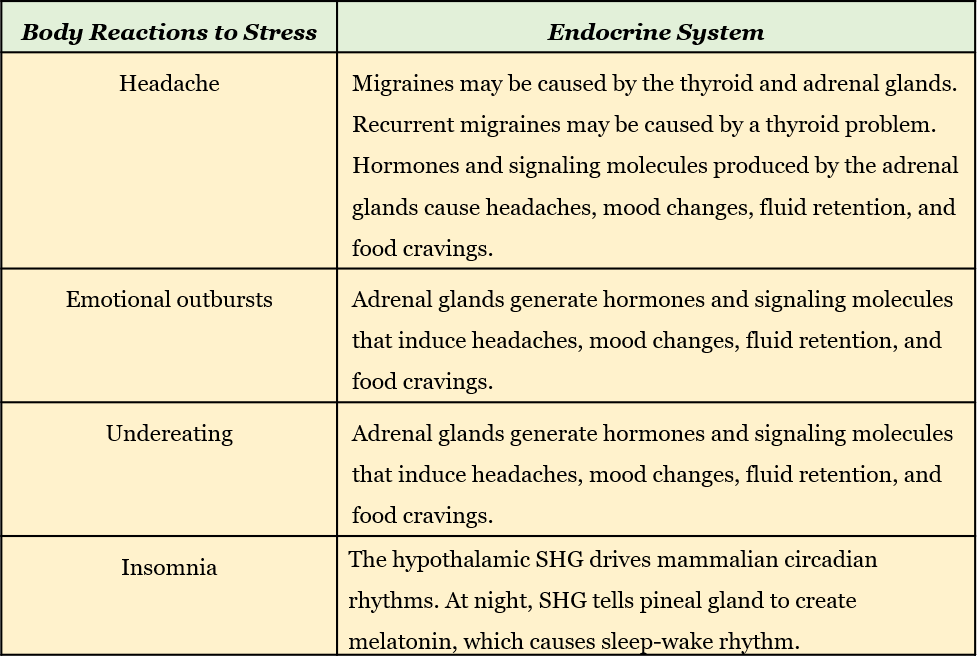Stress is fundamentally about how the body reacts to a potential threat. Some stress, known as eustress, prepares us for certain challenges and is thus beneficial. Another type of stress, known as distress, is harmful. A stressor is any stimulus that causes a stress response. Heat or cold, environmental toxins, toxins released by bacteria, heavy bleeding from a wound or surgery, or a strong emotional reaction are all examples of stressors. Stress responses can be pleasant or unpleasant, and they differ between people and even within the same person at different times.
Body Reactions or Clinical Manifestations to Stress
When I am stressed, I often display symptoms and directly feel repercussions on my body, emotions, and/or behavior. The following are some of the most typical side effects, as well as how my endocrine system influences them:

Adrenal Glands
When it comes to the body's stress response, the adrenal glands are the game changers. Each adrenal gland is divided into two sections: the outer cortex, which comprises the majority of the gland, and the internal medulla, which is made up of glandular epithelial tissue. Mineralocorticoids, glucocorticoids, and gonadocorticoids are produced by the cortex, while epinephrine/adrenaline and norepinephrine are produced by the medulla.
The Acute Stress Response
When your senses detect a potentially dangerous or threatening event, the amygdala—a part of the limbic system involved in memory and emotion—sounds the first alarm. The hypothalamus initiates this phase of the stress response by releasing a hormone known as CRH, which signals the pituitary gland to release another hormone known as ACTH.
If the perceived threat persists after the initial surge of epinephrine, a system known as the HPA axis will kick in to help the body remain alert and ready for action. HPA is a useful acronym because it represents the hypothalamus, pituitary, and adrenal glands in the correct order.
Chronic Stress
Chronic stress occurs when the body is constantly responding to stress and is unable to recover fully. Cortisol levels can remain elevated for extended periods of time. High-pressure jobs, financial difficulties, relationship problems, and trauma are just a few examples of long-term stressors that can have negative psychological and physiological consequences.
Inference
Amygdala, sympathetic nervous system, hypothalamus, anterior pituitary gland, adrenal glands, and adrenal cortex are the key players in the body's response to stress. Although the acute stress response is critical to our survival, allowing us to react in time to avoid potentially life-threatening situations, chronic stress can be harmful to one's health.
———————————————
References:
- Archyde. (2022, September 14). Sleep disorders and the endocrine system. Retrieved from https://www.archyde.com/sleep-disorders-and-the-endocrine-system-knife/
- LaRee. (2019, January 28). #3 – Headaches – Endocrine System. Retrieved from Butterfly Expressions: https://butterflyexpressions.net/2019/01/28/3-headaches-endocrine-system/
- Snider, L. (2020, March 19). The Endocrine System: The Adrenal Glands and the Stress Response. Retrieved from Visible Body: https://www.visiblebody.com/blog/the-endocrine-system-the-adrenal-glands-and-the-stress-response
- Tortora, G. J., & Derrickson, B. H. (2017). Principles of Anatomy and Physiology (15th ed.). Wiley.